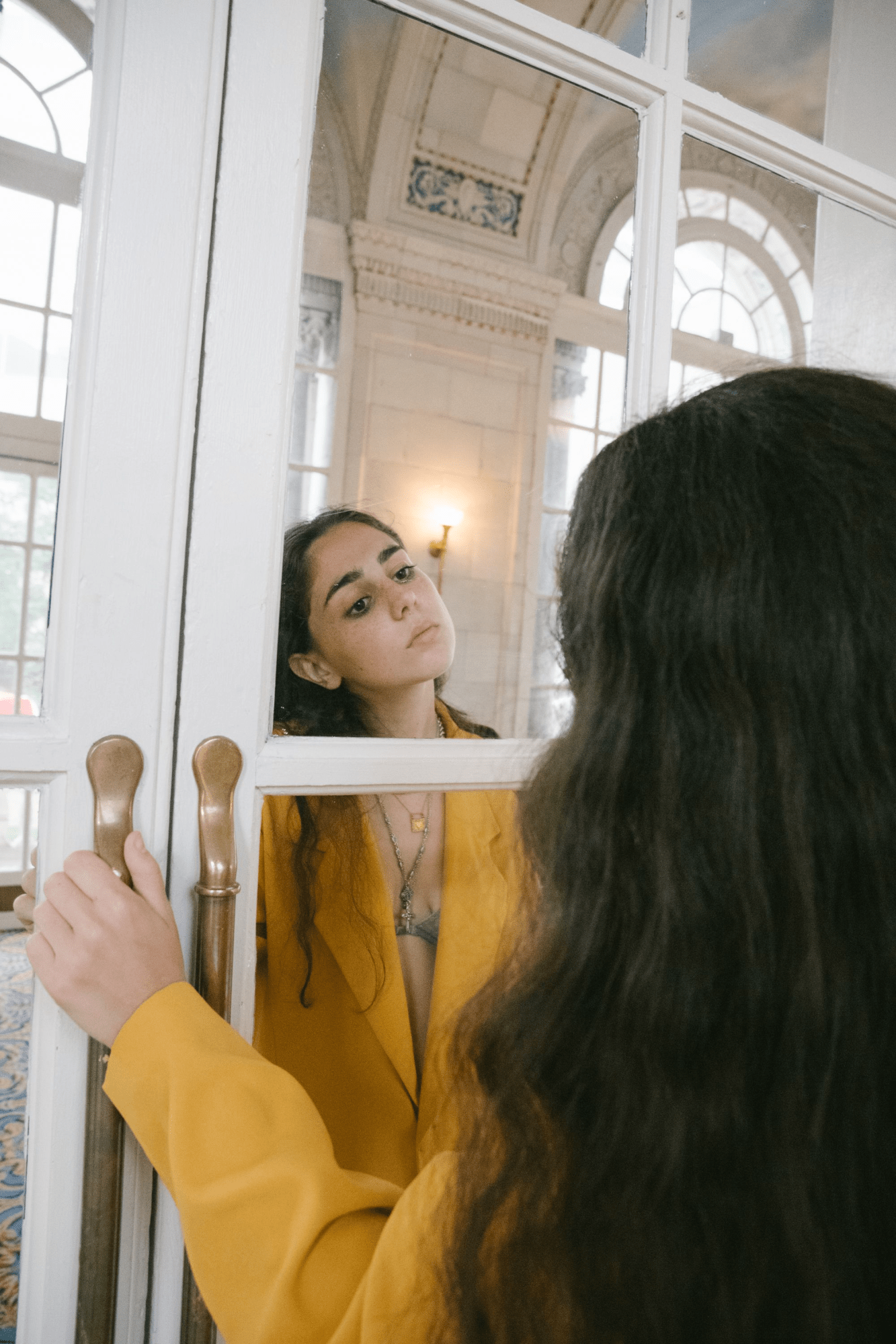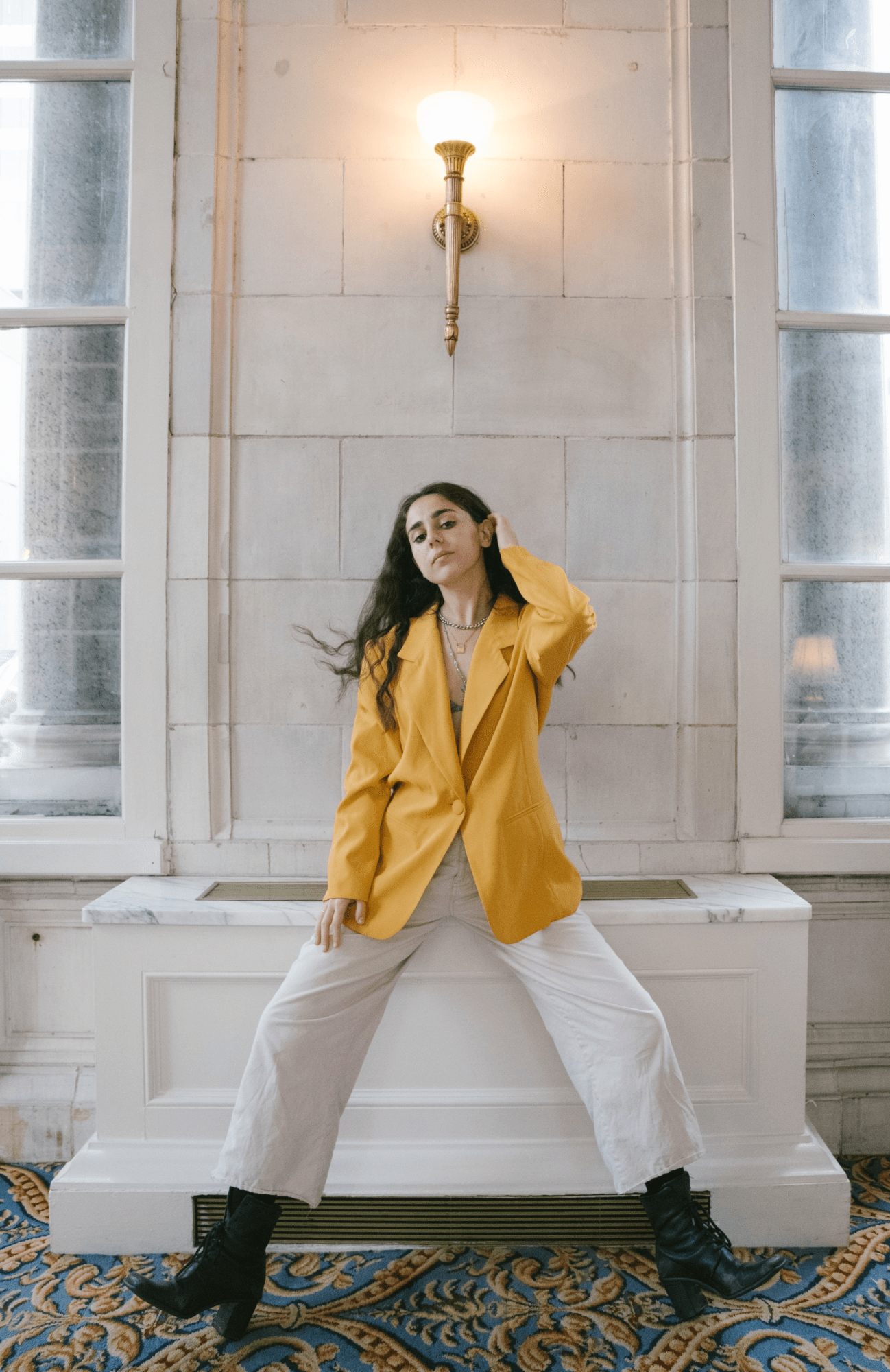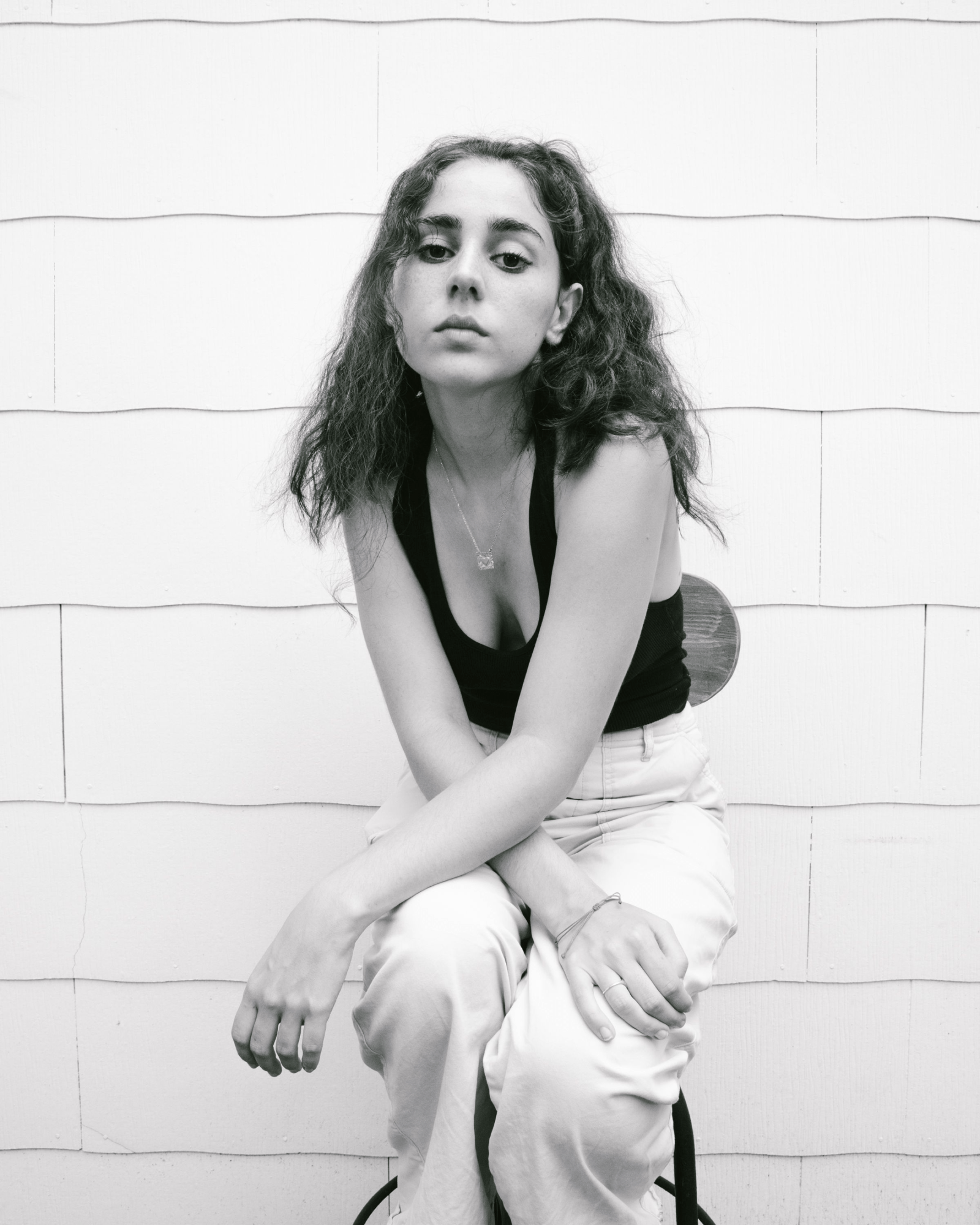It sounds like staring numbly into nothingness. And then a voice swells up. In Arabic, a woman sings a child’s nickname, her voice distorted beneath layers of fuzzy, phone line feedback: the last voicemail the musician Samia’s grandmother left her before she passed away three years ago. They both shared the same name; the song a symbol of her Lebanese heritage that’s been passed down through her family tree. It’s a comfort to her, one that opens her debut album, The Baby. A reminder that she’s not alone.
“I am the baby,” Samia admits, speaking via video call from her home in New York. The 23-year-old is proud of how much she relies on being cared for by others. So much so, in fact, that it’s informed what she calls the “thesis” of the record she’s spent much of her adult life building up to. “Part of the story of this album emotionally was accepting that I need people,” she says. “I always had an overwhelming fear of loneliness; I wanted that to be a part of who I am.”
We spend a lot of time trying to hide our insecurities and present ourselves as powerful people, but here, Samia Finnerty (who sheds her surname when she makes music) has created a body of work indebted to the despondence we all experience as a generation living malevolently inside our heads. Possessing a desire to be held, or acknowledged at least.

She has just got back to the city having spent a few weeks in Nashville. “I really had to change my scenery,” she says. In lockdown, the city she has lived in for nearly a decade changed vastly. It died for a while. That limbo experience, living in a city that usually doesn’t stop, reminded her how much she needed space to breathe. In many ways, The Baby doesn’t sound like a New York album. It’s by no means offishly “cool”. Everything rolls off Samia’s tongue like it’s been buried inside her somewhere, brewing into how it eventually appears on record. It’s painful, often sardonic, but always superb.
It’s also entirely autobiographical, written from those aforementioned experiences of being a young person trying desperately to make a point heard. The single “Big Wheel” is a gentle folk-rock song laced with minor micro-aggressions Samia’s too scared to vocalise in real life. Its chorus is simple: “I got bad news but I didn’t fight.”
She’s tried so many times to try and write a grandiose, imaginative narrative as a counterpart to real life, “but part of what drives me to write is an interest in communicating something I don’t have the skills to conversationally,” she admits. “The reason I write is to get that feeling out.
Born in Los Angeles to two creative parents (her father, Dan Finnerty, is a musician; her mother, Kathy Najimy, is an actor known best for Hocus Pocus and Sister Act) she’s been writing these songs since her teenage years, but didn’t have the driver’s license to drop by open mic nights to perform them the way she wanted to. Her family upped sticks to New York City when she was 15, and that changed. “I’ve never felt more supported by a community than I did here,” Samia says. “I just begged everyone to let me be in their band. Any experience I could get, I took.” In college she started her own band, which developed into the solo project that she’s creating now.
Her strange breakout moment came with a song she’d like to “re-frame”: a bold punk-rock number called “Someone Tell the Boys” that was, upon release, instantly added to a Spotify playlist titled “Badass Women”. She was 20 years old, and had been raised a feminist by her parents from a young age. “Those ideals were deeply embedded in my identity, for sure,” she recalls. “I learned about politics and social activism from a really early age.” That period of rebellion most young women go through was a struggle for her, because the politics she wanted to align herself with had already shaped who she was. But that framing of being seen as an empowering female songwriter is conflicting to many young women who wind up on these playlists, Samia included. “A lot of the time, everything [women write] is categorised or reframed as empowerment, and I don’t often write from a place of empowerment. Usually, when I’m writing it’s from a place of desperation and pain.”

She wrote and produced the record almost exclusively with friends, having tried working with “middle-aged men in LA who have really impressive credits and resumes” but, for one reason or another, never really gelling with their visions. They were the ones who helped her “whittle [these songs] down to what’s necessary”, having started them as pieces of poetry that seldom fit a traditional song structure. The results on The Baby are melodic but amorphous; choruses are often a line long, like to-the-point outcries. You get the impression that the pent-up emotion Samia can’t express in person is more flagrant here. She is shy in person but clear-cut in her songwriting.
The song that means the most to her is “Is There Something in the Movies?”, a folkish ode to a fractured relationship she told Pitchfork was about “heartbreak and disenchantment with the entertainment industry”, and feeling secondary to the lure of that often toxic lifestyle. She sings about a stuffed pig she was given by the late Brittany Murphy as a child, who is referred to in the lyrics as “someone who died of attention and lived an extraordinary life”. One of the final lines that bring it back to that ill-fated relationship sounds, bitingly, like half a threat: “I only write songs about things that I’m scared of / So here, now you’re deathless in art”. The video stars Maya Hawke and Charlie Plummer, the Lean On Pete actor she has been linked with in the past.
She was nervous, at first, for the people who she wrote these songs about to hear them. “There are a couple of people who I was particularly worried about, because I’m so unambiguous and list transcripts of events as they happened. I’m so intent on being honest about my own experiences but I never want to exploit someone else’s. Ultimately, it’s been a growing and healing process to talk about them.”
By now, Samia is ready to put the conflicts of adolescence in her past. She and her friends have been thinking about that toxic “age window of opportunity” for young women who write music, but she hasn’t been concerned about that lately. Instead, “I just love feeling less confused about who I am.”
The music she makes is brilliant because of her life experiences, but the romanticisation of being a young, tortured women songwriter is not part of her MO. The validation from male audiences is something she understands but is not interested in. What she is interested in, however, is longevity, and making music that people can find glimmers of themselves within. That her album has been some time in the making is only a testament to its bruised, brilliant beauty. “Even if it would make me a more attractive candidate for stardom,” Samia says. “I’d never be 18 again in a million years.”
Samia’s debut album The Baby is out on 28 August
